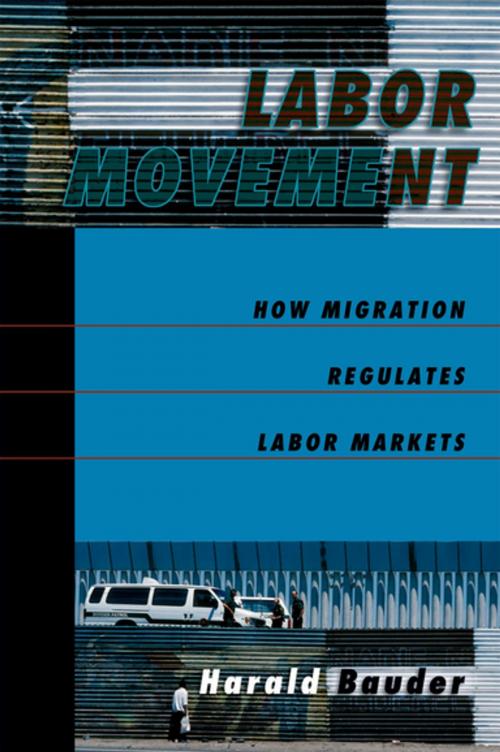Labor Movement
How Migration Regulates Labor Markets
Nonfiction, Social & Cultural Studies, Social Science, Demography, Business & Finance, Career Planning & Job Hunting, Labor, Human Geography| Author: | Harald Bauder | ISBN: | 9780190208356 |
| Publisher: | Oxford University Press | Publication: | February 23, 2006 |
| Imprint: | Oxford University Press | Language: | English |
| Author: | Harald Bauder |
| ISBN: | 9780190208356 |
| Publisher: | Oxford University Press |
| Publication: | February 23, 2006 |
| Imprint: | Oxford University Press |
| Language: | English |
Throughout the industrialized world, international migrants serve as nannies, construction workers, gardeners and small-business entrepreneurs. Labor Movement suggests that the international migration of workers is necessary for the survival of industrialized economies. The book thus turns the conventional view of international migration on its head: it investigates how migration regulates labor markets, rather than labor markets shaping migration flows. Assuming a critical view of orthodox economic theory, the book illustrates how different legal, social and cultural strategies towards international migrants are deployed and coordinated within the wider neo-liberal project to render migrants and immigrants vulnerable, pushing them into performing distinct economic roles and into subordinate labor market situations. Drawing on social theories associated with Pierre Bourdieu and other prominent thinkers, Labor Movement suggests that migration regulates labor markets through processes of social distinction, cultural judgement and the strategic deployment of citizenship. European and North American case studies illustrate how the labor of international migrants is systematically devalued and how popular discourse legitimates the demotion of migrants to subordinate labor. Engaging with various immigrant groups in different cities, including South Asian immigrants in Vancouver, foreigners and Spätaussiedler in Berlin, and Mexican and Caribbean offshore workers in rural Ontario, the studies seek to unravel the complex web of regulatory labor market processes related to international migration. Recognizing and understanding these processes, Bauder argues, is an important step towards building effective activist strategies and for envisioning new roles for migrating workers and people. The book is a valuable resource to researchers and students in economics, ethnic and migration studies, geography, sociology, political science, and to frontline activists in Europe, North America and beyond.
Throughout the industrialized world, international migrants serve as nannies, construction workers, gardeners and small-business entrepreneurs. Labor Movement suggests that the international migration of workers is necessary for the survival of industrialized economies. The book thus turns the conventional view of international migration on its head: it investigates how migration regulates labor markets, rather than labor markets shaping migration flows. Assuming a critical view of orthodox economic theory, the book illustrates how different legal, social and cultural strategies towards international migrants are deployed and coordinated within the wider neo-liberal project to render migrants and immigrants vulnerable, pushing them into performing distinct economic roles and into subordinate labor market situations. Drawing on social theories associated with Pierre Bourdieu and other prominent thinkers, Labor Movement suggests that migration regulates labor markets through processes of social distinction, cultural judgement and the strategic deployment of citizenship. European and North American case studies illustrate how the labor of international migrants is systematically devalued and how popular discourse legitimates the demotion of migrants to subordinate labor. Engaging with various immigrant groups in different cities, including South Asian immigrants in Vancouver, foreigners and Spätaussiedler in Berlin, and Mexican and Caribbean offshore workers in rural Ontario, the studies seek to unravel the complex web of regulatory labor market processes related to international migration. Recognizing and understanding these processes, Bauder argues, is an important step towards building effective activist strategies and for envisioning new roles for migrating workers and people. The book is a valuable resource to researchers and students in economics, ethnic and migration studies, geography, sociology, political science, and to frontline activists in Europe, North America and beyond.















